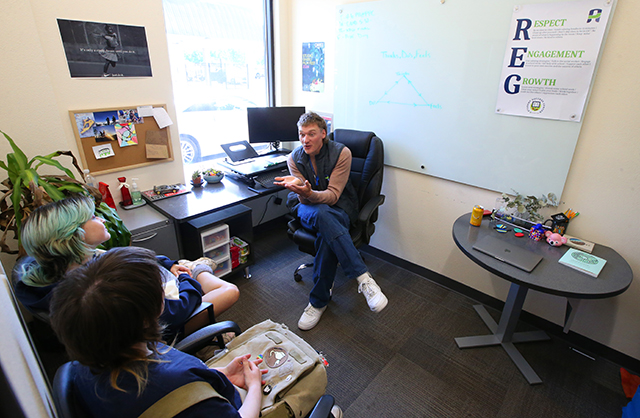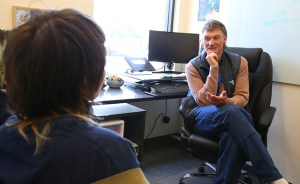Loss of OSU-Cascades grant leaves future school counselors in limbo
Published 5:45 am Wednesday, May 28, 2025

- Kieran Kuiper, counselor for Redmond Proficiency Academy, right, talks with two Redmond Proficiency Academy students in his office at the Redmond Proficiency Academy in Redmond Wednesday morning. 5-21-25 Andy Tullis/The Bulletin
When Ashily Von Hurst finishes a full day as a school counselor at Crook County Middle School, she heads to OSU-Cascades for evening classes to complete her master’s degree in school counseling. But a looming loss of federal funding has put that goal and the future of the program that supports her in jeopardy.
Von Hurst, who lives in Prineville and is entering her second year in the program this summer, is one of several local students trying to figure out how to finish their degrees after a $3.9 million federal grant was unexpectedly not renewed.
“It was pretty devastating to hear about that, and to get that email,” she said. “It’s not just devastating for myself, I want to recognize that it’s devastating for my peers, it’s devastating for Dr. Moran, Dr. Purgason and everybody who has contributed to making this possible for us. I think something that people also don’t consider is that it’s devastating for the students who we are training to support.”

School counselor for Redmond Proficiency Academy, Kieran Kuiper, right, discusses topics with two Redmond Proficiency Academy students in his office at the Redmond Proficiency Academy in Redmond Wednesday morning. 5-21-25 Andy Tullis/The Bulletin
Funding not renewed
Trending
Two years ago, Oregon State University-Cascades received a $3.9 million grant from the U.S. Department of Education to help students studying master’s of school counseling get their degrees and be placed in on-site internships in local schools. The remaining funding is viable through the end of the year, said officials.
The grant, called Promoting and Advancing Training of High Desert School Counselors, was expected to last another three years. The five-year grant was meant to provide full tuition for up to 75 eligible students and monthly stipends for those students who applied. OSU-Cascades officials collaborated with the High Desert Education Service District and the Bend-La Pine, Crook County, Jefferson County and Redmond school districts.
OSU-Cascades professor of counseling Lucy Purgason, who co-directs the program with professor Molly Moran, said it was hard when the team learned a few weeks ago that the grant wouldn’t be renewed. Since it is a non-continuation of funding, it allows the university to use the grant funding until the end of the budget year, which ends in December. Students should still receive tuition support for the summer and fall terms.
“(When we first got the grant) we were seeing record applications for the program but more importantly, applications from individuals who are working already in our partnership districts,” she said. “We know them so well, when we got that email, all I could see were faces of our students and their families. Some are parents, their partners, they’re working, many full-time, in schools right now, which is incredible.”
Several students in the program are already employed by local school districts as teachers, educational assistants or counselors. Students can either complete the program full-time in two years or part-time in three years by taking evening classes.
Purgason said the team is nervous that students might not be able to continue their degrees. Though the grant is reviewed annually, she was expecting it to be renewed because it was meeting its goals and even creating new positions.
Trending
None of her current students, that Purgason knows of, have decided to drop out, and most of the students who are starting the program in June will also continue, she said. Three students are graduating this year, there are 11 students in next year’s graduating cohort and there are 10 students who have been admitted to start this year, she said.
“We’re most concerned about this first-year part-time cohort that still has two more years, and we’re trying to think, could we potentially have them take more classes, while funding is still present so they can get more credits paid for, what are some possibilities there?” she said.
Purgason is planning to meet with organizers in Corvallis to consider options.
Not every school district in the area is partnered with the program for internships, and students must meet eligibility requirements to qualify for the grant.
“The program has been very successful, and that is just so humbling. The funds were the barrier. Cost of tuition is just so challenging, and people are more financially impacted than ever,” said Purgason.
The grant has also allowed the program to strengthen its relationship with Central Oregon school districts.
Jennifer Hauth, director of student services at Bend-La Pine Schools, said the district has been grateful to the program to help train school counselors who stay to work locally.
“It’s really devastating for us,” she said. “We need highly trained counselors in the region especially as we continue in this mental health crisis across the nation.”
The program expanded to have a second practicum site for counseling students at R.E. Jewell Elementary this year.
“We know based on research that mental health continues to be a priority for young people, suicide continues to be the leading cause of death for young people in Central Oregon. I think the number is declining,” Hauth said. “So having a robust partnership with the university system to continue to grow our workforce and make sure that our schools are well-staffed with highly trained counselors is a priority for us.”
One counselor’s path
The counseling program has been an extremely supportive environment for Von Hurst, she said. She initially thought she would be a teacher, but midway through her degree and in the midst of student teaching, she realized she actually preferred the one-on-one conversations with students and wanted to pursue counseling instead.
“I have never had an experience better than what I have experienced in this program currently,” she said. “I’m working harder than I ever have. The professors and the environment that is in this program just truly show how much they care about their students and wanting us to succeed.”
Von Hurst said she’s going to finish her degree, but is still considering how to finish financing it once the grant funding ends in December. She’s grateful that she had the option to work full-time while taking classes part-time.
“A lot of us are in that boat of what does this mean? What does our future look like when we’re so passionate about this career and this program and these people we’re with and then almost to have it taken away,” she said. “This program is about investing in the mental health and well-being of the next generation and removing it, canceling it, us losing it, feels like we’re taking a step backwards.”
Von Hurst, 29, shared stories of students she formed a rapport with when she was student teaching. She kept checking in with a middle school student who was not engaged in any of his classes, and after a while, he started asking for help. The next year, he told his sister, a new student, to go to Von Hurst if she needed help with anything.
“It was just ‘wow’. The fact that we had this connection, that he’s leaving and going to high school, but that I was the safe person and I was the ear to listen to, then almost like having me be passed on, recommended to his little sister,” she said. “It really solidified, yep, I am not meant to push academics. I don’t want to be that person that’s just worried about a student’s grade or they’re not doing work. I am a counselor. I am here to listen and to talk to, to just be that person for students.”
As a counselor, she checks in on students who need support for anxiety, who might be experiencing suicidal ideation or who might be going through troubles at home. Students can make an appointment with her at any time. She also teaches lessons on social-emotional learning, monitors students at lunch and attends Individualized Education Program meetings.
“We have a small cohort, and everybody in this cohort that I’m in school with, we are all in for school counseling, and we are all going to work in Central Oregon,” she said. “Already building these connections that I have, I’m with my peers for two to three years, depending on if they’re full-time or part-time, and knowing that we’re all going to work in a Central Oregon school…This program has really made me feel like I belong and that I am pursuing something that I should be pursuing.”
Making the experience possible
Kieran Kuiper, 30, who works as a counselor at Redmond Proficiency Academy, graduated from the OSU-Cascades program. He was a student before the grant was awarded, and the funding made his experience easier, he said. Students intern at a high-needs school in Central Oregon, and commit to working at a rural Oregon school district for a few years after graduating.
“I was working 35 to 40 hours a week, while also attending classes full-time,” Kuiper, who lives in Bend, said. “I was working to pay for school and to pay my rent. Then Dr. Moran and Dr. Purgason applied for and received the grant, and they had let us know that they were applying for it, halfway through, and that was a huge thing for me, because it was gonna potentially free up some of that stress. So I applied for it, received the grant, and that made my experience, pathway, possible, because I was then able to go and work in Bend-La Pine school district the next year without being paid.”
He interned at La Pine High School three days a week. For a project, Kuiper created a plan to serve the needs of first-generation college students at the school. In addition, he helped with scheduling and checking in on students. He was also substituting at Bend High School two days a week.
“(The grant’s cancelation is) unfortunate for all these different reasons because people who would typically not have the opportunity to attend or be a part of this master’s program, who live in Central Oregon, who are a part of communities that are here, may not have that opportunity in the future,” he said. “The resources are being limited for students in Central Oregon…I know that that program is transformative in a lot of different ways.”
At Redmond Proficiency Academy, he meets with students and teaches a psychoeducation and group counseling class.
“The majority of school is figuring out how do I be a person that exists within systems and institutions…the school counselor gets to teach the other side of that. Maybe 40% of school is math, reading, writing, English, health, P.E., things of this nature, the other 60% is: how do I be a human? How do I exist in this weird world and body where there are these expectations of me?” Kuiper said. “You see people change and grow and that’s the essence of everything.”










